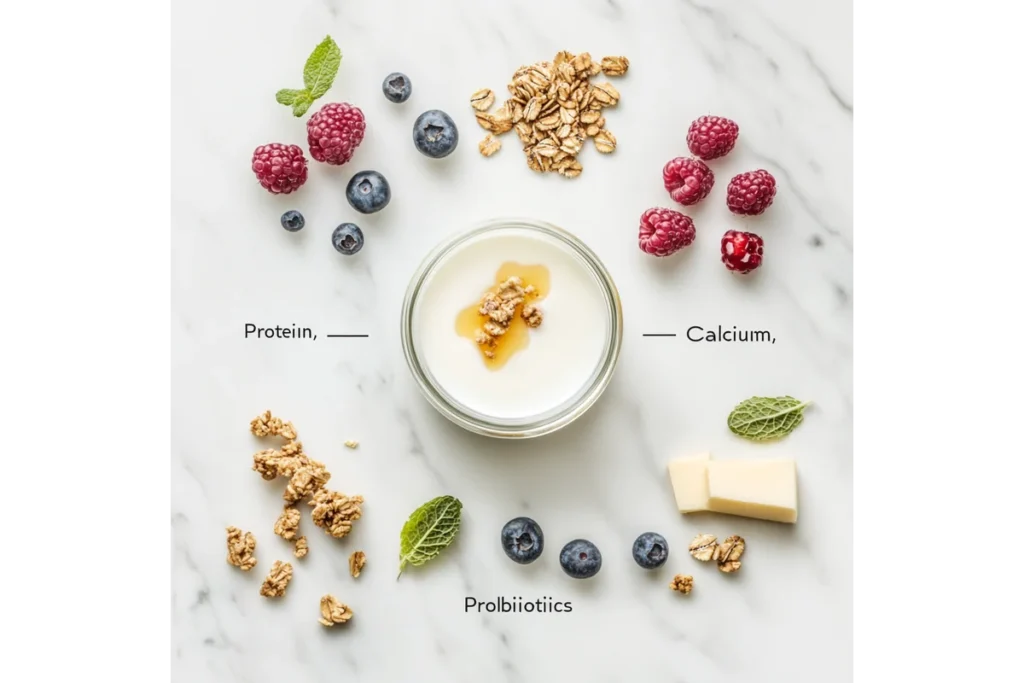Introduction to Greek Yogurt and Its Popularity
What is Greek Yogurt?
You’ve probably seen it chilling in the dairy aisle, but what exactly makes Greek yogurt stand out? Unlike regular yogurt, Greek yogurt is strained multiple times to remove excess whey, giving it that thick, velvety texture we all love. Honestly, it’s like the cool older sibling of traditional yogurt—richer, creamier, and packed with more protein. Oh, and did I mention it’s been a staple in Mediterranean diets for centuries? Yeah, this isn’t some new fad; it’s got serious staying power.
Fun fact: The straining process not only concentrates the flavor but also boosts the nutrient density . That means you’re getting more bang for your buck with every spoonful. And let’s face it, who doesn’t want that?
Table of Contents
Why is Greek Yogurt So Popular?
Let’s be real—people are nuts about Greek yogurt these days, and for good reason. It’s become the go-to choice for anyone looking to up their protein game without piling on the calories. Plus, it’s super versatile—you can toss it into smoothies, layer it in parfaits, or even use it as a sub for sour cream.
But here’s the kicker: it’s not just about taste or texture. With so many folks focusing on gut health and weight management, Greek yogurt checks all the boxes. It’s no wonder it’s flying off the shelves faster than you can say “probiotics.”
So, whether you’re already a fan or just curious about the hype, stick around. We’re about to break down why Greek yogurt deserves a spot in your fridge—and maybe even your heart.
Nutritional Profile of Greek Yogurt
High Protein Content in Greek Yogurt
When it comes to protein, Greek yogurt is basically a rockstar. In fact, it has nearly double the protein content of regular yogurt, which makes it a top choice for anyone wondering what are the benefits of Greek yogurt . A typical serving packs around 15-20 grams of protein, making it a great option for post-workout recovery or just keeping hunger at bay.
Here’s the thing: protein isn’t just about building muscles—it also helps your body repair tissues and even supports your immune system. So, if you’re looking for a snack that keeps you full and energized, Greek yogurt is a no-brainer. Plus, it’s way tastier than chugging a plain protein shake, don’t you think?
By the way, if you’re trying to cut back on meat but still want to meet your daily protein needs, this yogurt can totally step in as a plant-based alternative. Honestly, it’s like having a secret weapon in your diet.
Low Sugar and Low Fat Options
If you’re worried about sugar, Greek yogurt has got you covered. Unlike some regular yogurts that sneak in extra sugar, many brands offer low-sugar or unsweetened options. This is especially helpful if you’re managing your blood sugar levels or simply trying to eat cleaner.
On top of that, you’ve got choices when it comes to fat content. Whether you prefer full-fat for that rich, creamy texture or non-fat to keep things light, Greek yogurt lets you customize based on your goals. For instance, full-fat varieties can be great for kids or anyone needing extra calories, while low-fat versions are perfect for weight watchers.
So, whether you’re after something indulgent or lean, there’s a Greek yogurt out there for you. And honestly, that flexibility is one of the reasons people love it so much.
Rich in Essential Vitamins and Minerals
Now, let’s talk about the vitamins and minerals in Greek yogurt . First up, it’s loaded with calcium , which is super important for strong bones and teeth. Then there’s vitamin B12 , which helps your body produce red blood cells and keeps your nerves in tip-top shape.
But wait—there’s more! Greek yogurt is also rich in potassium , which helps regulate blood pressure. And of course, we can’t forget the probiotics. These friendly bacteria are key for gut health, and they play a big role in answering what are the benefits of Greek yogurt . They help balance your digestive system, which can reduce bloating and keep things running smoothly.
All in all, Greek yogurt isn’t just delicious—it’s packed with nutrients that support your overall well-being.
Health Benefits of Greek Yogurt
Supports Digestive Health
One of the biggest perks of Greek yogurt is how it supports your gut. Thanks to its probiotics, it helps maintain a healthy balance of “good” bacteria in your digestive system. This is crucial because a happy gut can mean fewer tummy troubles like bloating or constipation.
Interestingly, research shows that probiotics can even boost your mood. That’s right—your gut and brain are more connected than you might think. So, if you’re feeling a bit off, a serving of Greek yogurt might just help turn things around.
Plus, if you’ve ever wondered what are the benefits of Greek yogurt for long-term health, consider this: a healthy gut can lower your risk of certain diseases, like irritable bowel syndrome (IBS). It’s like giving your body a little tune-up from the inside out.
Promotes Weight Loss
Let’s face it—losing weight can feel like an uphill battle. But here’s where Greek yogurt shines. Its high protein content helps you feel fuller for longer, which means you’re less likely to reach for unhealthy snacks.
In fact, studies suggest that people who include yogurt in their diets tend to have better weight management outcomes. Why? Because protein-rich foods like Greek yogurt can reduce cravings and help you stick to your goals.
Oh, and here’s a pro tip: pair your yogurt with some fiber-rich toppings like berries or nuts. Not only does it taste amazing, but it also keeps you satisfied even longer. Honestly, it’s a win-win.
Strengthens Bone Health
If you’re looking to keep your bones strong, Greek yogurt should be on your radar. It’s packed with calcium and often fortified with vitamin D , both of which are essential for bone health.
This is especially important as you age because your bones naturally lose density over time. Eating calcium-rich foods like Greek yogurt can help slow down this process and reduce your risk of osteoporosis.
And here’s the kicker: strong bones aren’t just about preventing fractures. They also support your overall mobility and quality of life. So, adding Greek yogurt to your diet is like giving your future self a gift.
Boosts Immune System
Finally, let’s talk about immunity. The probiotics in Greek yogurt don’t just help your gut—they also give your immune system a boost. This means you might get sick less often, which is always a plus.
Additionally, the vitamins and minerals in Greek yogurt , like zinc and vitamin B12 , play a role in keeping your immune system strong. So, if you’re wondering what are the benefits of Greek yogurt during cold and flu season, this is a big one.
In short, eating Greek yogurt regularly can help you stay healthier year-round
Culinary Uses of Greek Yogurt
Greek Yogurt as a Substitute in Recipes

Let’s be real—Greek yogurt isn’t just for breakfast. It’s a kitchen chameleon that can step in for all sorts of ingredients. For example, you can use it as a healthier swap for sour cream, mayonnaise, or even cream cheese. Want to lighten up your favorite dip or frosting? Just fold in some Greek yogurt , and voilà—you’ve got a creamy, guilt-free alternative.
Here’s a fun idea: next time you’re making tacos, try dolloping Greek yogurt instead of sour cream. You’ll get the same tangy flavor but with way more protein. And honestly, once you start using it as a sub, you’ll wonder how you ever lived without it.
Delicious Snack and Breakfast Ideas
If you’re looking for quick and tasty ways to enjoy Greek yogurt , the possibilities are endless. Start your day with a parfait layered with granola, fresh fruit, and a drizzle of honey. Or blend it into a smoothie for a protein-packed breakfast on the go.
And here’s a tip: if you’re trying to figure out what are the benefits of Greek yogurt for busy mornings, think about how it keeps you full longer. A bowl of yogurt with toppings like nuts or chia seeds can power you through until lunch.
Oh, and don’t forget about savory options! You can mix Greek yogurt with herbs and spices for a killer dip or spread. Seriously, it’s so versatile that you’ll never get bored.
Greek Yogurt in Savory Dishes
Now, let’s talk about taking Greek yogurt beyond sweet treats. It’s a game-changer in savory recipes too. Use it as a base for creamy salad dressings or marinades—it adds a rich texture without the heaviness of mayo or cream.
For instance, whisk it with lemon juice, garlic, and dill for a Mediterranean-inspired sauce that pairs perfectly with grilled chicken or veggies. Or stir it into soups to give them a velvety finish. Honestly, once you start experimenting, you’ll see why Greek yogurt is a must-have in any kitchen.
Greek Yogurt vs. Regular Yogurt
Key Differences Between Greek Yogurt and Regular Yogurt

So, what sets Greek yogurt apart from regular yogurt? Well, the biggest difference is the straining process. While regular yogurt retains more whey, Greek yogurt is strained multiple times, giving it that thick, creamy texture we all love.
But it’s not just about texture. When you compare the two, Greek yogurt typically has more protein and less sugar than regular yogurt. This makes it a better choice if you’re wondering what are the benefits of Greek yogurt for weight management or muscle building.
On the flip side, regular yogurt tends to have more calcium per serving, which might make it a better pick for bone health. So, it really depends on your goals.
Environmental Impact of Greek Yogurt Production
Here’s something to chew on: producing Greek yogurt can have a bigger environmental footprint than regular yogurt. Why? Because the straining process creates whey byproduct, which needs to be disposed of responsibly.
That said, some brands are stepping up by finding eco-friendly ways to repurpose whey, like turning it into fertilizer or animal feed. If sustainability is important to you, look for brands that focus on ethical practices.
Potential Drawbacks of Greek Yogurt
Lactose Intolerance and Greek Yogurt
If you’re lactose intolerant, you might be wondering if Greek yogurt is a safe bet. The good news? It actually contains less lactose than regular yogurt because of the straining process. That said, it’s not completely lactose-free, so it might still cause issues for people with severe sensitivities.
Here’s a tip: If dairy doesn’t sit well with you, look for plant-based alternatives like coconut or almond yogurt. But if you’re only mildly sensitive, you might find that Greek yogurt works just fine. Honestly, it’s all about testing what your body can handle.
Caloric Considerations
While Greek yogurt is often touted as a healthy snack, not all varieties are created equal. Some flavored options can pack a surprising amount of sugar and calories, which kinda defeats the purpose if you’re trying to eat clean.
So, here’s the deal: always check the label before buying. Stick to plain, unsweetened versions, and add your own toppings like fresh fruit or a drizzle of honey. This way, you’re in control of what goes into your body.
Oh, and one more thing—portion size matters. Even though Greek yogurt is nutritious, overdoing it can lead to extra calories. Moderation is key, folks!
FAQs :

The main difference lies in the straining process, which removes excess whey and gives Greek yogurt its thick texture and higher protein content. Plus, it tends to have less sugar than regular yogurt, making it a favorite among health-conscious eaters.
Why is Greek Yogurt the Healthiest?
When people ask why Greek yogurt is considered one of the healthiest options out there, it all comes down to its nutrient-packed profile. For starters, it’s loaded with protein—way more than regular yogurt—which helps keep you full and supports muscle repair. Plus, it’s rich in probiotics, which are like tiny superheroes for your gut health.
But wait, there’s more! Greek yogurt is also a great source of calcium, vitamin B12, and potassium, all of which are essential for strong bones, energy production, and heart health. And let’s not forget—it often comes in low-fat or non-fat varieties, making it a smart choice for anyone watching their calorie intake. Honestly, it’s like nature’s multivitamin in a cup.
Is Greek Yogurt Good for Weight Loss?
Absolutely! If you’re wondering what are the benefits of Greek yogurt for weight loss, here’s the scoop: its high protein content helps curb hunger, so you’re less likely to reach for unhealthy snacks between meals. Protein also boosts your metabolism, which can help you burn more calories throughout the day.
Plus, Greek yogurt is versatile enough to fit into any diet plan. You can enjoy it plain for a low-calorie snack, or jazz it up with fresh fruit and nuts for added fiber and healthy fats. Just be sure to steer clear of flavored varieties packed with added sugars—they can sabotage your weight loss goals. Stick to plain, unsweetened Greek yogurt , and you’ll be golden.
What Time is Best to Eat Greek Yogurt?
The beauty of Greek yogurt is that it’s super flexible—you can enjoy it pretty much anytime! That said, some times might be better than others depending on your goals.
For example, eating Greek yogurt in the morning is a great way to kickstart your day. It’s packed with protein and nutrients that keep you energized and satisfied until lunch. Pair it with fruit or granola for a balanced breakfast.
If you’re looking to fuel your workouts, try having it as a pre- or post-workout snack. The protein helps repair muscles, while the carbs (from toppings like fruit) replenish your energy stores.
And don’t forget about nighttime! A small serving of Greek yogurt before bed can be a calming treat, thanks to its calcium content, which may help promote better sleep. Honestly, it’s a win no matter when you eat it.
Conclusion :
Summarizing the Benefits of Greek Yogurt
At this point, you’re probably convinced that Greek yogurt is a total powerhouse. From its high protein content to its gut-friendly probiotics, it’s no wonder people are obsessed. Whether you’re using it as a snack, a meal base, or a cooking substitute, Greek yogurt fits seamlessly into almost any diet.
Honestly, when you think about what are the benefits of Greek yogurt , it’s hard not to be impressed. It supports digestion, boosts immunity, strengthens bones, and even helps with weight management. Plus, it’s just plain delicious.
For more delicious recipes and kitchen inspiration, stick around and explore our other articles.
Print
Benefits of Greek Yogurt: Health, Nutrition & Recipes
- Total Time: 5 minutes
- Yield: 1 serving 1x
- Diet: Vegetarian
Description
Discover the amazing health benefits of Greek yogurt, its rich nutritional profile, and creative ways to incorporate it into your diet. Packed with protein, probiotics, and essential nutrients, Greek yogurt is a superfood you’ll want to add to your daily routine.
Ingredients
- 1 cup plain Greek yogurt (low-fat or non-fat, depending on preference)
- Fresh fruits (e.g., blueberries, strawberries, bananas)
- Nuts or seeds (e.g., almonds, chia seeds, or walnuts)
- Optional: Honey or maple syrup for sweetness
- Optional: Granola for crunch
Instructions
- Start with the Base : Scoop 1 cup of plain Greek yogurt into a bowl. This will serve as the creamy, nutrient-rich foundation of your dish.
- Add Fresh Fruits : Top your yogurt with fresh fruits like sliced bananas, berries, or diced apples for natural sweetness and added vitamins.
- Sprinkle Nuts or Seeds : Add a handful of nuts or seeds for healthy fats, protein, and texture. Chia seeds or almonds work great!
- Sweeten It Up (Optional) : Drizzle a teaspoon of honey or maple syrup if you prefer a touch of sweetness.
- Finish with Granola : For extra crunch and fiber, sprinkle granola on top.
- Serve and Enjoy : Grab a spoon and dig into this delicious, healthy treat!
Notes
- Always choose plain, unsweetened Greek yogurt to avoid added sugars.
- Customize your toppings based on your dietary goals—add more protein, healthy fats, or fiber as needed.
- Greek yogurt can also be used as a substitute for sour cream, mayonnaise, or cream cheese in recipes for a healthier twist.
- Prep Time: 5 minutes
- Cook Time: N/A (No cooking required!)
- Category: Breakfast, Snack, Healthy Eating
- Method: No-cook, Assembly
- Cuisine: Mediterranean-inspired
Nutrition
- Serving Size: 1 servings
- Calories: Approx. 150-200 calories (depending on toppings)
- Sugar: 6g (from plain Greek yogurt; additional sugar from toppings like honey or fruit)
- Sodium: 50 mg
- Fat: 0g-8g (varies based on fat content of Greek yogurt)
- Saturated Fat: 0g-4g
- Unsaturated Fat: 0g-4g
- Trans Fat: 0 g
- Carbohydrates: 6g-15g
- Fiber: 2g-4g (from toppings like nuts, seeds, or fruit)
- Protein: 15g-20g
- Cholesterol: 5mg-10mg
Keywords: Greek yogurt benefits, Greek yogurt nutrition, healthy Greek yogurt recipes, high-protein snacks, gut health, weight loss foods, probiotic-rich foods

